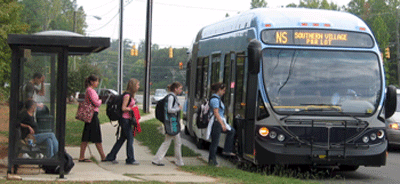Chapel Hill Transit
{Cross Posted from Chapel Hill News}

If you boarded a Chapel Hill Transit bus back in February, you might have been greeted by someone with a clipboard asking you to answer a few questions about your ride. The results of this survey were just released and include relevant and interesting findings as we think about the future of transit in our community.
These survey data tell us quite a bit about who rides Chapel Hill Transit. Most riders (88 percent) were somehow affiliated with UNC, and 93 percent of those surveyed were taking the bus to get to college or work. A majority (68 percent) ride the bus five days a week while another 21 percent use it three or four days a week.
Whenever there’s a new development proposal pending before a local governing board, the center of the conversation always seems to gravitate toward traffic. Given this tendency, I think it’s important we understand historic traffic changes in Chapel Hill and Carrboro.
The North Carolina Department of Transportation maintains historic traffic counts for urban areas around the state, including Chapel Hill. These traffic counts date back to 1997, with the most recent data being from 2013. With this in mind, let’s take a look at the average annual daily traffic in some major areas around town:
|
Area
|
1997
|
2004
|
2013
|
Change, 2013 vs. 1997
|
|
W Franklin St (just west of Columbia St)
|
17,400
|
18,000
|
12,000 |
At a work session earlier this month, the Chapel Hill Town Council received a report on the fiscal sustainability of Chapel Hill Transit. The report describes CHT's current situation as akin to “tale of two cities.” One the one hand the system has been enormously successful in attracting new ridership and on the other hand facing some fairly significant obstacles because of that sucess. The report identifies funding as the chief area of concern, noting that the urgent need for capital expenses mostly to help replace the agency's aging fleet.
In response to the meeting, a slew of stories appeared with headlines like "Chapel Hill Transit Could Start Charging For Bus Rides." That got me and a few of OrangePolitics' other editors thinking: what would happen if the system really were to start charging fares as a way to be more sustainable? After talking it over a bit, we came up with (at least) two potential issues:
Coffee and buses, under most circumstances, discussing these two seemingly unrelated things in the same sentence would seem strange, that is unless you're talking about a certain part of Chapel Hill. I of course am talking about Weaver Diary Road, a fairly major thoroughfare in the Northern part of of town whose underwhelming bus service marks a major problem for the Chapel Hill Transit system.
The fundamental problem lies in the fact that the current bus line that services Weaver Diary Road, the T Route, only goes as far as East Chapel Hill High School. If a resident of the lower section of Weaver Dairy wants to go grab coffee at the popular Joe Van Gogh cafe located at the Timberlyne shopping complex via public transit, they will be forced to take a long and complicated route with at the very least 1 transfer. Furthermore, Joe Van Gogh is but one of many prominent businesses located at the intersection of MLK Boulevard and Weaver Dairy Road, all of which are not easily accessible to the residents of lower Weaver Dairy Road due to the current alignment of the T Route.
Early voting starts week! Don’t forget out there and let you voice be heard.
While both school boards and the Hillsborough Town Board, the County Commissioners will consider operational changes at the Community Home Trust and endorsing staff recommendations for new bus service in the central and rural parts of the county. The Carrboro Alderfolks will schedule a public hearing on the Lloyd Farm Conditional Use Permit and the Chapel Hill Town Council will review a number of development proposals.
Throughout the week, Chapel Hill Transit will hold public input meetings on the North-South Corridor.
Here’s the full summary:
CARRBORO BOARD OF ALDERPERSONS
Pages
About Us
OrangePolitics is a not-for-profit website for discussing progressive perspectives on politics, planning, and public policy in Orange County, NC. Opinions are those of their authors. Learn more.
Community Guidelines
By using this site, you agree to our community guidelines. Inappropriate or disruptive behavior will result in moderation or eviction.
Zircon - This is a contributing Drupal Theme
Design by
WeebPal.


